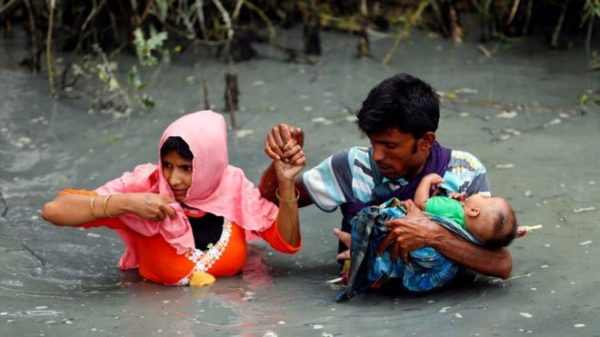About 270,000 Rohingya Muslims have sought shelter in Bangladesh since violence erupted in Myanmar two weeks ago, the UN says.
A spokeswoman said the jump – up from 164,000 on Thursday – was because new pockets of people had been found.
She called the figure “so alarming” and said urgent action was needed to address the situation in Myanmar.
Those fleeing say Myanmar’s military are burning their villages and attacking them. The violence began on 25 August when Rohingya militants attacked police posts in Myanmar’s northern Rakhine state.
Rohingya residents – a stateless mostly Muslim minority in a Buddhist-majority nation – say the military and Rakhine Buddhists responded with a brutal campaign against them. Myanmar rejects this, saying its military is fighting against Rohingya militants.
For two weeks, Rohingya families have been streaming north across the Bangladesh border.
Vivian Tan, a spokeswoman for the UN refugee agency UNHCR, said the latest surge in numbers “does not necessarily reflect fresh arrivals within the past 24 hours but that we have identified more people in different areas that we were not aware of before”.
Existing refugee camps are full and people who had crossed the border were setting up shelters “on the roads or whatever empty space they could find”, she said. They were “exhausted, hungry and desperate for shelter”, a UNHCR briefing note said.
Some are trekking to the Naf River, which forms the border, and others are sailing up the coast. At least 300 Rohingya boats arrived in Cox’s Bazar, in Bangladesh, on Wednesday, the UN’s migration body said.
The Rohingya plight is sparking concern and protests in many nations, and Myanmar’s de facto leader Aung San Suu Kyi has been criticised for failing to protect them.
On Thursday, South Africa’s Archbishop Desmond Tutu, one of the leading figures in the anti-apartheid struggle, added his voice, saying: “If the political price of your ascension to the highest office in Myanmar is your silence, the price is surely too steep.”
He urged Ms Suu Kyi, a Nobel Peace laureate who spent years under house arrest for her pro-democracy activism, “to speak out for justice, human rights and the unity of your people”.
There are calls for her Nobel Peace Prize to be withdrawn, but Nobel committee chair Berit Reiss-Andersen said that was not possible.
Speaking on Norwegian radio, she said Ms Suu Kyi won the prize because of her “role as a freedom fighter in Myanmar and against the military dictatorship”.
“And we do not have the mandate, nor is it our task to evaluate what Nobel laureates do after they have won the prize,” she said.
Earlier in the week, Ms Suu Kyi – who faces strong anti-Rohingya sentiment in Myanmar – claimed the crisis in Rakhine state was being distorted by a “huge iceberg of misinformation”.
She subsequently said that Myanmar had “to take care of everybody who is in our country, whether or not they are our citizens”, and said Myanmar would “try our best” despite inadequate resources.
Those who have fled northern Rakhine state bring tales of village burnings, beatings and killings at the hands of the security forces and Buddhist youths.
Ms Suu Kyi’s government says it is the Rohingya militants and the Muslim villagers themselves who are burning their own homes and attacking non-Muslims.
But a BBC reporter in Rakhine state on Thursday saw a Muslim village being burned, apparently by a group of Rakhine Buddhists, contradicting the official narrative.






Leave a reply